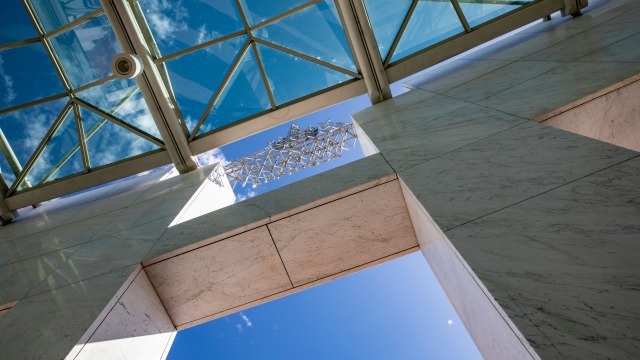Opinion: Albanese facing a new mood of pick and kick

By Mark Kenny
A version of this article was originally published by The Canberra Times.
There was an odd atmosphere on Capital Hill on the final scheduled sitting day for 2024.
A taut electric vibe tussled with a summery last-day-of-school looseness. Haggard correspondents intoned philosophic, wearily resigned to their designation as villains in the febrile digital colosseum of political combat.
With an unholy crush in the Senate - 31 bills passed on one day and 45 for the week - nervous but footloose lower house MPs killed time.
Ministers floated between offices, affecting calm in that way trial lawyers do after closing arguments when everything hangs on a curmudgeonly judge or an inscrutable jury.
The Speaker, Milton Dick, expressed his thanks to the sprawling complex's thousands of staff for keeping operational what Anthony Albanese described as "the most visited building in Australia".
And it certainly seemed "most-visited" at Aussies on Thursday morning - the roiling social hub where over three decades, Dom Calabria and his father Tony have furnished coffee and meals to stressed press gallery journos, MPs, PMs and frontbenchers, and an infinity of lobbyists and public officials.
In their ritual post-question time speeches before the summer break - a bilateral nod to civility dubbed "the hypocrisies" by one scribe - Albanese and Peter Dutton praised old Tony's 28-year stint at Aussies.
"Tony is the man who did so much to enhance the seat of democracy here," Albanese remarked warmly to his fellow "Italo-Australian" looking up to the public gallery where three generations of Calabrias watched on.
Dutton lauded the ailing 84-year-old's migrant story having emigrated at just 14. "He has worked every day since then, he has educated his children, he has provided a role model and has given that love to his family that has created a remarkable legacy," Dutton said.
In other comments, Albanese revealed that he and Dutton did not hate each other after all.
He noted that while he had visited Morrison's office only once as opposition leader (a startling factoid since the global pandemic occasioned a bipartisanship likened to wartime), Dutton had been into Albanese's prime ministerial suite, well, "more often than I'd like". Cue laughter.
Yet coursing impatiently under all this ersatz chumminess, was the existential fight to come.
Each knows that within months, one will be up, the other, finished.
Statistically, Labor is not the "natural party of government".
Since the Second World War, it has occupied the Treasury benches for just 29 years.
Nonetheless, Labor goes into next year's election comforted by electoral history and shielded by an unofficial "Swiss G]guard" of community independents.
But that historical precedent - every first-term federal government since 1932 has secured a second term - may amount to nothing in this disintermediated age of antisocial media and permanent grievance.
For the 93 years since the rookie Scullin Labor government crashed along with everything else in the Great Depression, incumbency has been a winged keel. Australian voters have tended to pick and stick, at least once. Now though, around the democratic world in 2024, the vogue is to "pick then kick".
But what about that Swiss guard of independents? Albanese's worst-case scenario is that one or all of the first-term teals lose. Another risk is that some back a Dutton executive.
Currently Labor has 78 seats to the Coalition's 58. Dutton needs a net gain of 18 seats to govern in his own right. A huge task.
Polls suggest the most likely outcome is a minority parliament. Labor could lose half a dozen seats to Dutton's Liberals and still be close enough to credibly seek crossbench commitments for supply and confidence.
But what would the teal independents do - who would they prefer to form government? The lesson from the minority Gillard period is that indies who hold conservative seats but back progressive governments face extinction themselves.
In this light,, it may be instructive to consult the AEC's "two-party preferred" exercise, in which it allocated all 151 "Reps" seats to either of the two major parties (irrespective of whether the seat actually fell to a third party).
Unsurprisingly, it shows that preferences for either of the two majors (ahead of the other) favoured the Liberals by the following percentages in teal seats: Curtin (5.4), Goldstein (4.8), Kooyong (4.1 ), Mackellar (8.6), Warringah (1.4), Wentworth (5.9).
These pro-Liberal margins may even expand in a 2025 election devoid of the unpopular Morrison.
Yet this cuts both ways. In formerly safe Labor Fowler, Dai Le (assuming she survives) would have to ignore a strong Labor proclivity in her seat to back a Dutton-led minority government.
Another outlier is Alexander Downer's erstwhile stronghold of Mayo, held by the centre-right indie Rebekah Sharkie. Her Adelaide Hills seat actually favoured Labor by 1.6 per cent in 2022.
In all three of the Queensland seats filched by the Greens in 2022, voters preferred Labor - even the two secured from the LNP, Brisbane and Ryan.
Nationally, the polls show a busy and productive Labor trailing Dutton's detail-light rhetorical assault over cost of living and immigration. The hardline Queenslander is a more effective political communicator than even his own colleagues thought when they overlooked him in 2018.
In 2025, Labor remains the narrow favourite. But its hardheads recognise that no opposition leader is unelectable, no historical precedent immutable, and no seat lead impregnable.
Mark Kenny is the Director of the ANU Australian Studies Institute and host of the Democracy Sausage podcast.








